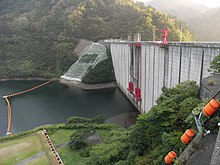reservoir
A reservoir (from the French. Réservoir of réserve , "stock") is generally for a (large) container , tank or reservoir for the storage of water or other liquids , with the objective to use these at a later time.
Technical reservoirs
Reservoirs are part of a water supply. In flat terrain, they are mounted on prominent towers ( water towers ), but wherever the topography allows, water reservoirs are built on heights around settlements as (mostly) underground tanks or as open reservoirs. The area around drinking water reservoirs is considered a water protection zone and should therefore be used as little as possible (with regard to the restrictions on use in various water protection zones, see the article " Protected areas in water management and water protection "). Afforestation protects the drinking water from excessive warming in summer and also reduces or saves the addition of disinfectants (chlorine) to the drinking water.
Examples:
- Precipitation reservoir
- Drinking water reservoir
- Extinguishing water reservoir
- Gasoline reservoir
- Semen reservoir (at the tip of the condom)
- Lubricant reservoirs for linear systems
Biological reservoirs
In biology, natural reservoirs are those animal species in which, for example, viruses are reproduced over long periods of time without the infected individuals showing signs of disease. Such host animals are therefore also called reservoir hosts . They can be the starting point for the pathogen to transfer to other species, under which the infection can then cause considerable damage. More on this under pathogen reservoir .
